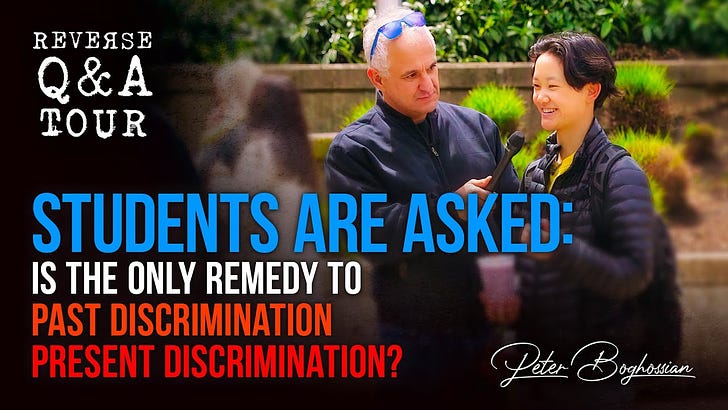In his best-selling book How to Be an Antiracist, Ibram Xolani Kendi (born Ibram Henry Rogers), wrote, “The only remedy to past discrimination is present discrimination. The only remedy to present discrimination is future discrimination.” This claim, more than any other we examined on our Reverse Q&A tour, needs thoughtful examination because it is the core idea behind “equity”—a principle which has transformed virtually every institution in our society within the last seven years. And this is exactly why I conducted the epistemological exercise/game with this statement more than any other.
In the same paragraph, Kendi explicitly notes the importance of discrimination as a method for bringing about equity. And one would think that along with the ubiquitous adoption of equity as a value, most people would understand what it is, why it matters, and how it’s transforming our institutions. But most people do not. In fact, as these videos show, participants have not thought as deeply about the claim as they should, given its prominence in American moral life.
I want to be clear that I do not think equity, or rectifying past discrimination against African Americans by discriminating against non-African Americans, is the way forward. I think it is an indelible vandalism on life, liberty, and the pursuit of happiness. But these Reverse Q&As are not about what I think, they are about what students think, why they think it, and what it would take to change their minds. With a few targeted questions, the reasons why “The only remedy to present discrimination is future discrimination” is held tenaciously are revealed, along with the attitudes that keep the belief in place.
As always, please feel free to leave comments below or in the videos. My team and I read every comment and use these as a source of improvement.
Thank you,
Peter Boghossian
Over the next two weeks, we’ll share six RQ&A discussions on Kendi’s claim. This first conversation is between four students at a university in Oregon.
Discussion about this post
No posts



This was one of the most productive discussions I’ve seen you have. I wish more of my classroom discussions looked like this in college.
About Kendi’s statement — I do find it interesting how many people just parrot it without analyzing it. There’s only so many remedies you can bestow on past injustices before it becomes a futile effort.
The past happened and it can’t be changed. The best we can do is look critically at the past and present and make sure the past doesn’t happen again.
If you guys don't work harder to ridicule these people out of existence in the public sphere and relegate their books to the remainders bin of history, you might as well stay home and brood.
They just get richer every day and every day another elementary school classroom is destroying the brains of our children, and mostly their parents cheer it on with the fervor of a tent revival adherent.
You are gentle and thoughtful and wise and meanwhile the Khmer Rouge are just piling up the skulls in their wake.
How do we *really* fight back? I mean, so another generation isn't lost as we watch, sadly?